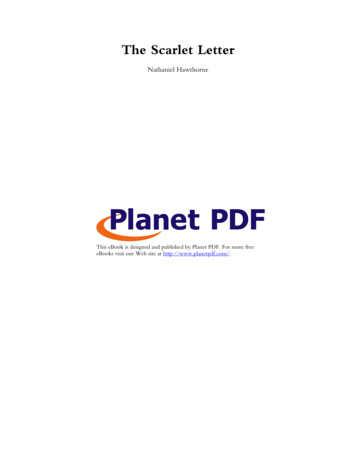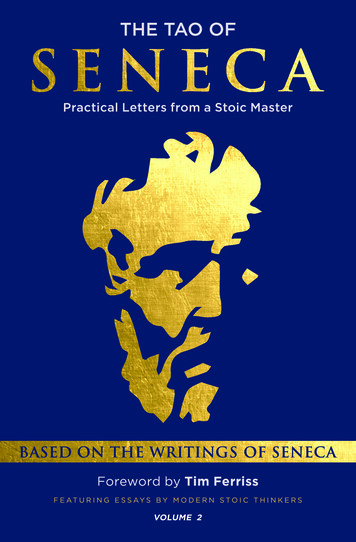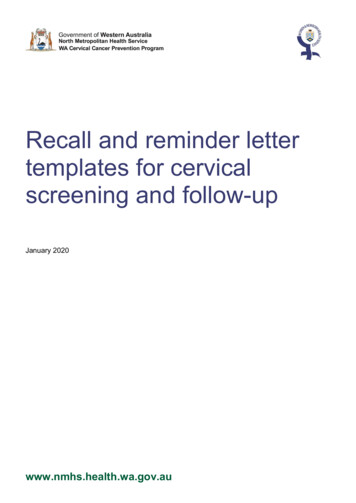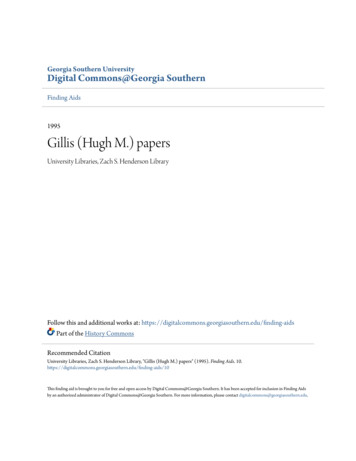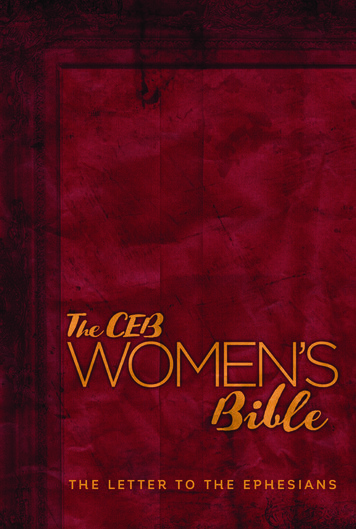
Transcription
THE LE T TE R TO THE E PHE SIANS
The CEBWOMEN’SBibleAvailable October 4, 2016HARDCOVER97816092618876.1875” x 9.1875” 49.99DECOTONE97816092618946.1875 X 9.1875 74.99Watch videos from the editors and find out more atCEBWomensBible.com
table of contents6810151726293338FeaturesEditoral BoardContributorsPreface to The CEB Women’s BibleThe Letter to the EphesiansExamples of ProfilesProfiles IndexesArticle IndexAbout the CEBThis is an uncorrected proof for promotional purposes only. Please do notquote or reprint without permission from the publisher.
featuresIntroductionsEach book of the Bible has an introduction that covers the historical and cultural situation ofthe text, including issues of special interest for women.The Introductions and Reflections for each book were written by the same contributor andare signed.6
ReflectionsBefore each chapter,there will be a briefreflection on the textthat ranges in tonefrom contemplative tosomething more like astudy note.PortraitsThere are charactersketches of women inthe Bible, named andunnamed, scatteredthroughout the text. ThePortraits are written bya variety of women andare signed.There is also an Index of every woman in the Bible, named and unnamed.ArticlesThroughout the Bible,there are special articleson different topics thatare either specific towomen (“Birth Control,”“Miscarriage,” “TheGlass Ceiling,” etc.)or are more generalin nature but thathighlight aspects ofthe experience thatare specific to women(“Vocation,” “Stress,”“Depression,” etc.). TheArticles are written by avariety of women andare signed.Other Features Full-color presentation page Sixteen pages of full-color maps from National Geographic7
editorial boardChris, Judy, Jaime, Ginger, and RachelRachel BaughmanExecutive Pastor, Discipleship, University Park United Methodist Church, Dallas, TexasRev. Rachel Baughman is a sixth generation United Methodist minister. She is serving currentlyas Executive Pastor of University Park United Methodist Church where she has been since 2007.A graduate of Texas Wesleyan University and Drew Theological Seminary, Rachel has contributedto and edited a long list of resources for Sparkhouse press. Rachel is a certified Birkman coach andloves consulting with church staffs across the country to improve their mutual understandingand their ability to work well with each other. Her husband, Rev. Mike Baughman, is also aUnited Methodist minister. They live in the Dallas, Texas, area with four children.Christine A. ChakoianPastor/Head of Staff, First Presbyterian Church of Lake Forest, Lake Forest, IllinoisRev. Christine Chakoian has led the First Presbyterian Church of Lake Forest, Illinois, since8
2005. Chris earned her DMin from McCormick Theological Seminary, her MDiv from YaleDivinity School, and her BA in Religion and Culture from the University of Illinois. In serviceto the larger church, Chris sits on the board of trustees of McCormick Theological Seminary aswell as the Presbyterian Publishing Corporation. A writer and speaker, her most recent book,Cryptomnesia: How a Forgotten Memory Could Save the Church, explores how challenges facing thechurch today are similar to those of the earliest Christians. Co-host and editor for CovenantBible Study, Chris is also a columnist for The Presbyterian Outlook. She is married to John W.Shustitzky, PhD, on the faculty of the Chicago School of Professional Psychology. They have onechild, Anna, who is currently in graduate school.Jaime Clark-Soles, NT EDITORAssociate Professor of New Testament, Altshuler Distinguished Teaching Professor, Perkins School ofTheology, Dallas, TexasRev. Dr. Jaime Clark-Soles received her BA from Stetson University where she studiedPhilosophy and Russian Studies. She earned her MDiv from Yale Divinity School and her PhD inNew Testament from Yale University. She is the author of numerous books and essays, and sheenjoys speaking widely and writing for both academic and popular audiences. Her newest book,Reading John for Dear Life: A Spiritual Walk with the Fourth Gospel, will be available in September2016. Currently, she is writing a book on women in the Bible, which will be available in 2017.Jaime also contributed to both Disciple Bible Study and Covenant Bible Study. As an ordainedAmerican Baptist minister, Jaime has served in both parish and hospice settings. She is amember of Royal Lane Baptist Church in Dallas, Texas. She loves racquetball and cycling andgenerally staying in motion.Judy Fentress-Williams, OT EDITORProfessor of Old Testament, Virginia Theological Seminary, Alexandria, VirginiaRev. Dr. Judy Fentress-Williams received her PhD in Hebrew Bible from Yale University whereher dissertation reflects her interest in a literary approach that celebrates the multiple voicesand inter-textuality of scripture. She earned her MDiv from Yale Divinity School and her AB inEnglish from Princeton University with certificates in African-American Studies and AmericanStudies. Judy has published many essays as well as a commentary on the book of Ruth for theAbingdon Old Testament Commentary Series. She is also a contributor to Covenant Bible Study.A member of the Society of Biblical Literature, she is an active participant in the Bakhtin andBiblical Studies Group, and she serves on the Advisory Board for the Office of Religious Life atPrinceton University. Judy serves as a minister at Alfred Street Baptist Church in Alexandria,Virginia, and is married to Kevin Williams, MD. They have two children, Samantha and Jacob.Ginger Gaines-CirelliSenior Pastor, Foundry United Methodist Church, Washington, DCIn 2014, Rev. Ginger E. Gaines-Cirelli became the first woman to serve as Senior Pastor of historicFoundry UMC in Washington, DC. A graduate of Yale Divinity School, Ginger has served a varietyof congregations: small and large, urban and suburban. For over 20 years as a pastor-theologian,her ministry has encouraged spiritual growth and engaged discipleship—emphasizing radicalhospitality, shared ministry, spiritual practices, and solidarity with the poor and oppressed. Sheenjoys gardening, yoga, poetry, art, ice cream, travel, and hiking and is married to Dr. Anthony T.Gaines-Cirelli, a Catholic theologian, currently serving the U.S. Conference of Catholic Bishopsas a Director in their Ecumenical and Interreligious Affairs office. The Gaines-Cirellis live inWashington, DC, with their cat Annie Rose and dog Harvey.9
contributorsDiana Abernethy, PhD candidate in Hebrew Bible, Duke Divinity School, Duke University,Durham, North CarolinaThe Rev. Fay C. Acker, director of spiritual guidance and pastoral care, Andrew RankinMemorial Chapel, Howard University, Washington, DCThe Rev. Jann Aldredge-Clanton, PhD, adjunct professor at Perkins School of Theology,cochair of Equity for Women in the Church, Inc., Dallas, TexasThe Rev. Sharon Ann Alexander, rector, Trinity Episcopal Church, Baton Rouge, LouisianaThe Rev. Jennifer Andrews-Weckerly, rector, Episcopal Church of St. Margaret, Plainview,New YorkThe Rev. Rachel Baughman, executive pastor of discipleship, University Park UnitedMethodist Church, Dallas, TexasThe Rev. Elizabeth Caldwell, PhD, professor emerita, McCormick Theological Seminary,Chicago, IllinoisThe Rev. Cynthia M. Campbell, PhD, president emerita, McCormick Theological Seminary,Chicago, Illinois, senior pastor, Highland Presbyterian Church, Louisville, KentuckyThe Rev. Christine Chakoian, senior pastor, First Presbyterian Church, Lake Forest, IllinoisThe Rev. Karen Chakoian, senior pastor, First Presbyterian Church, Granville, OhioThe Rev. Jaime Clark-Soles, PhD, associate professor of New Testament, Perkins School ofTheology, Southern Methodist University, Dallas, TexasElizabeth W. Corrie, PhD, associate professor in the Practice of Youth Education andPeacebuilding, Candler School of Theology, Emory University, Atlanta, GeorgiaThe Rev. Shannon Craigo-Snell, PhD, professor of theology, Louisville PresbyterianTheological Seminary, Louisville, KentuckyKaye Dacus, author and former vice president of American Christian Fiction Writers,Nashville, Tennessee10
Carol J. Dempsey, OP, PhD, professor of biblical studies, University of Portland, Portland,OregonMichal Beth Dinkler, PhD, assistant professor of New Testament, Yale Divinity School, YaleUniversity, New Haven, ConnecticutThe Rev. Rebecca Nelson Edwards, codirector of Braid Mission, San Francisco, CaliforniaThe Rev. Judy L. Fentress-Williams, PhD, professor of Old Testament, Virginia TheologicalSeminary, Alexandria, VirginiaThe Rev. Julia Lambert Fogg, PhD, associate professor of New Testament and earlyChristianity, California Lutheran University, Thousand Oaks, CaliforniaLeslie Cara Fuller, PhD, student in Hebrew Bible, Southern Methodist University, Dallas,TexasThe Rev. Wilda C. Gafney, PhD, associate professor of Hebrew Bible, Brite Divinity School,Texas Christian University, Fort Worth, TexasThe Rev. Ginger Gaines-Cirelli, senior pastor, Foundry United Methodist Church,Washington, DCJulie Galambush, PhD, associate professor of religious studies, The College of William &Mary, Williamsburg, VirginiaCary Gibson, artist-in-residence and elder, Downtown Presbyterian Church, Nashville,TennesseeThe Rev. Lisa Greenwood, vice president for leadership ministry, Texas MethodistFoundation, Central Texas Conference of The United Methodist Church, Fort Worth, TexasThe Rev. Anne Katherine Grieb, PhD, Meade Professor of Biblical Interpretation, VirginiaTheological Seminary, Alexandria, VirginiaThe Rev. Abby L. Thornton Hailey, senior pastor, Broadneck Baptist Church, Annapolis,MarylandThe Rev. Maria Dixon Hall, PhD, associate professor, Southern Methodist University,Dallas, TexasLisa Hancock, director of Restorative Communications, Dallas, TexasThe Rev. Heidi Haverkamp, vicar, The Episcopal Church of St. Benedict, Bolingbrook,IllinoisThe Rev. Pamela Hawkins, associate pastor, Belmont United Methodist Church, Nashville,TennesseeThe Rev. Suzanne Watts Henderson, PhD, associate professor of New Testament, QueensUniversity of Charlotte, Charlotte, North Carolina11
contributorsThe Rev. Rebecca David Hensley, associate director, Center for Leadership Development,North Texas Conference of The United Methodist Church, Fort Worth, TexasThe Rev. Leslie Herrscher, chaplain, Children’s Medical Center, Dallas, TexasAudrey Nicole Hindes, assistant director of student life and academic support, CandlerSchool of Theology, Emory University, Atlanta, GeorgiaThe Rev. Diana Holbert, senior pastor, Grace United Methodist Church, Dallas, TexasDenise Dombkowski Hopkins, PhD, Woodrow W. and Mildred B. Miller Professor ofBiblical Theology, Wesley Theological Seminary, Washington, DCKendra Weddle Irons, PhD, assistant professor of religion, Texas Wesleyan University, FortWorth, TexasRabbi Nancy A. Kasten, community advocate, Dallas, TexasThe Rev. Melody Knowles, PhD, vice president of academic affairs and associate professor ofOld Testament, Virginia Theological Seminary, Alexandria, VirginiaSarah Heaner Lancaster, PhD, Professor in the Werner Chair of Theology, MethodistTheological School in Ohio, Delaware, OhioThe Rev. Jennifer E. Logsdon-Kellogg, senior pastor, Calera United Methodist Church,Calera, OklahomaChristy Lynch, writer and editor, Abingdon Press, Nashville, TennesseeJodie Leigh Lyon, PhD, lecturer in theological studies, University of Georgia, Athens,GeorgiaKathi Macias, multi-award winning author and speaker, Homeland, CaliforniaThe Rev. E. Mireya Martínez, senior pastor, First United Methodist Church, Freeport, TexasHannah W. Matis, PhD, assistant professor of church history, Virginia TheologicalSeminary, Alexandria, VirginiaDora R. Mbuwayesango, PhD, George E. and Iris Battle Professor of Old Testament andLanguages, Hood Theological Seminary, Salisbury, North CarolinaMonica Jyotsna Melanchthon, PhD, associate professor of Hebrew Bible, MCD Universityof Divinity, Melbourne, AustraliaAnna Mercedes, PhD, associate professor of theology, College of St. Benedict/St. John’sUniversity, Collegeville, MinnesotaChristine Mitchell, PhD, professor of Hebrew scriptures, St. Andrew’s College, University ofSaskatchewan, Saskatoon, Saskatchewan12
contributorsThe Rev. Michelle J. Morris, PhD, associate pastor, First United Methodist Church of WestMemphis, West Memphis, ArkansasMonica Brown Moss, First Lady and leader of the Integrative Health Ministry, TrinityUnited Church of Christ, Chicago, IllinoisAlicia D. Myers, PhD, assistant professor of New Testament and Greek, Campbell UniversityDivinity School, Buies Creek, North CarolinaKatherine Newsome, MDiv student, Perkins School of Theology, Southern MethodistUniversity, Dallas, TexasThe Rev. Margaret Aymer Oget, PhD, associate professor of New Testament, AustinPresbyterian Theological Seminary, Austin, TexasThe Rev. Cynthia Park, PhD, associate rector, ministries of compassion, Grace EpiscopalChurch, Gainsville, GeorgiaPheme Perkins, PhD, professor of theology, Boston College, Chestnut Hill, MassachusettsSharon Lynn Putt, PhD, associate professor of theology and religion, Messiah College,Mechanicsburg, PennsylvaniaJanis Jaynes Quesada, PhD, instructor in religion, Brite Divinity School, Texas ChristianUniversity, Fort Worth, TexasThe Rev. Laura R. Rasor, senior pastor, Broadway United Methodist Church, Maryville,TennesseeGail A. Ricciuti, DDiv, associate professor of homiletics, Colgate Rochester Crozer DivinitySchool, Rochester, New YorkThe Rev. Laura Ann Gilbert Rossbert, minister of justice, Christ Church UnitedMethodist, Denver, ColoradoCynthia Ruchti, award-winning author and speaker, Pittsville, WisconsinThe Rev. Elizabeth Amanda Sayers, senior pastor, Covenant United Methodist Church,Montgomery Village, MarylandPamela J. Scalise, PhD, professor of Old Testament, Fuller Theological Seminary Northwest,Seattle, WashingtonThe Rev. Bonnie Scott, senior pastor, Trinity United Methodist Church, Germantown,MarylandDanielle Shroyer, pastor, Journey Church, Dallas, TexasNancy Sleeth, Christian environmentalist and managing director of Blessed Earth,Lexington, Kentucky13
contributorsJosey Bridges Snyder, PhD candidate in Hebrew Bible, Emory University, Atlanta, GeorgiaThe Rev. Amy Diane Spaur, senior pastor, Elmwood United Methodist Church, Dallas,TexasThe Rev. Marti J. Steussy, PhD, MacAllister-Petticrew Professor Emerita of BiblicalInterpretation, Christian Theological Seminary, Indianapolis, IndianaAnne W. Stewart, PhD, visiting assistant professor of Old Testament, Louisville PresbyterianSeminary, Louisville, KentuckyLauri A. Swann, campus minister, graduate and faculty ministries, InterVarsity ChristianFellowship, Washington, DCBeth Taylor, facilitator and coach in Growth Coaching, Relationship Building, and LeadershipDevelopment, Dallas, TexasThe Rev. Rebecca M. M. Voelkel, director of the Center for Sustainable Justice, LyndaleUnited Church of Christ, Minneapolis, MinnesotaThe Rev. Cynthia D. Weems, senior pastor, First United Methodist Church, Miami, FloridaAllyson Wermelskirchen, worship coordinator, The Chapel, Highland Park UnitedMethodist Church, Dallas, TexasAudrey West, PhD, adjunct professor of New Testament, Lutheran School of Theology atChicago, Chicago, IllinoisAmy C. Willis, PhD, associate professor of religious studies, Lynchburg College, Lynchburg,VirginiaKaren Strand Winslow, PhD, professor and chair of the Department of Biblical Studies,Azusa Pacific University, Azusa, California14
prefaceYou’re not alone when you open a Bible. God is with you and so are the voices and influencesof all with whom you’ve journeyed through life. Each person comes to the Bible froma particular life experience, which is often formed in a faith community and shapedcontinuously by relationships with family and friends. This lived experience also includes apersonal identity based in gender. It’s almost too obvious to say that we’re not all the same asindividuals or families or faith communities. Yet it might be liberating to admit that we arecreated by God, who intends this marvelous human diversity and delights in our distinctions.The CEB Women’s Bible affirms that the multiplicity of human voices, experiences, identities,and perspectives is a God-given gift.When you open a Bible, you see that a variety of voices have always been part of God’s goodcreation. As you engage with the biblical writings, it becomes clear that you are surrounded bya “great cloud of witnesses” who, in their own way and context, have encountered many of thesame things you experience in life today.By focusing on stories of women, named and unnamed, and by engaging the reflections andtopical articles that accompany the sacred text of this Bible, we hope that you—both womenand men—will find yourself in a new way. We hope that you’ll find yourself in the Bible, in theongoing story of God’s love and grace today, in a way that deepens your relationship with God,self, and others.The CEB Women’s Bible invites us into a deeper conversation with scripture—to question,wrestle with, explore, and receive the words and witness of the biblical texts from wherever weare on our journey. This deeper conversation helps us discover our own voices as we listen toGod’s voice. We anticipate that readers across genders will be inspired by this resource. As wenotice women in scripture who had until now been invisible to us, we train our hearts to noticeall of God’s people today. And as we seek guidance for our lives, examine our choices, and pourout our yearnings before God, this Bible invites us to ask what it means for us to be faithful inour time.The translators of the Common English Bible include both women and men, but all eightyeditors and commentators for the CEB Women’s Bible are women. We represent at least adozen different denominations and faith communities. Nearly half of us are biblical scholarswho train women and men for Christian ministry. We love the Bible, the details of the text,and its interpretation. Nearly half of us are pastors and church leaders who seek to equip ourcongregations with the knowledge and love of scripture. A few of us are novelists who tellstories about human experience, of life together in relationship and community. All are deeplycommitted to the power of God’s living word.15
The CEB Women’s Bible offers a number of useful elements for study and devotion:INTRODUCTIONS accompanying all the books of the Bible highlight major themes, providebackground information about history and culture, and include issues in the book that may beof particular interest to women.REFLECTIONS are found throughout every biblical book—usually one reflection perchapter, but sometimes more. The reflections carefully and thoughtfully engage the readerwith the text. These writings can be used in personal devotions, such as daily scripture readingand prayer. They can also be helpful in worship settings, when leaders and participants diveinto the Bible. Small groups can also benefit from the reflections, and an appendix providesadditional study questions designed for groups.SIDEBAR ARTICLES explore more than two hundred themes of particular relevance towomen’s experience of scripture. Some are theological in nature, on topics such as the Holy Spirit,suffering, or worship. Others explore timeless social issues including aging, discrimination,immigrants, and reproduction. Still others examine our personal relationships, such asdivorce, family, and friendship. All the topical articles invite us to thoughtfully consider theBible’s relevance for our world today.PORTRAITS include character sketches of over one hundred named and unnamed womenin the Bible. These profiles range from powerful women, such as Esther, who inspire us tomake a difference in the world, to overlooked women, such as Noah’s wife, often invisible butcrucial to the larger story. Still other profiles invite us to see the story anew through the eyesof a central figure, such as Jephthah’s daughter or Mary Magdalene. Each profile encouragesus to see both biblical and modern women with greater appreciation for their particular giftsand challenges of faith.An appendix includes STUDY QUESTIONS on select biblical narratives. There’s also anINDEX of all the women in the Bible, named and unnamed.Our aspiration is that the CEB Women’s Bible comes alive for you as a truly living word tochange your heart and life. In the process, the Bible speaks to you, and you speak to the Bible.If you always turn to the Bible for comfort, may you also discover bracing courage in thesepages as you read of Esther or the unnamed midwives who defended Moses. If you are annoyedwith the Bible’s patriarchy, may you find refreshing affirmation as you explore articles such as“Sisterhood,” “Leaving a Legacy,” and “Matriarchs.” If you find scripture spiritually nurturingbut irrelevant to the trials of our world today, may you encounter remarkable resonance withissues of war and peace, money and leadership. And if you experience the Bible as interesting butinaccessible, may you be richly fed by its nurturing spirit; for our deepest longings around bodyimage, calling, friendship, and fulfillment are not new. They are vividly alive in scripture.The Bible is our story; it’s your story. There’s a part of that story that only you can tell. We inviteyou to add your voice—your thoughts, opinions, insights, prayers—to the voices of women whohave spoken the good news throughout the centuries and who are helping the Bible speak today. Inthe pages of the Bible, we find that we are not alone. Indeed, we find our very selves in a new way.Jaime Clark-SolesJudy Fentress-WilliamsChristine ChakoianGinger Gaines-Cirelli16Rachel Baughman
EphesiansPaul’s letter to those in Ephesus aims at shaping Gentile churches in Christ. The designation“in Ephesus” (1:1) is missing from the most reliable manuscripts. This may indicate thatEphesians was originally a circular letter, distributed to multiple churches in Paul’s name, andmay also explain why the advice given is more general in nature. Ephesians shares much incommon with Colossians, including similar passages (e.g., Eph 3:1-13; Col 1:24–2:5) and areference to Tychicus (Eph 6:21; Col 4:7), one of Paul’s secretaries who may have written downand then circulated both letters while Paul was in prison (Eph 3:1; 4:1; Col 4:10, 18).Most scholars agree, however, that Ephesians was written not by Paul but by a discipleof Paul in his name. These scholars compare Ephesians with the seven undisputed Paulineletters to show that Ephesians uses longer sentences, different grammatical constructions, andunique terms (e.g., 1:18-23; 4:15; 5:6-14). The theology of Ephesians is also distinct. For example,Ephesians assumes a fully realized and present resurrection for believers rather than a futureone (2:6), focuses on sin as discrete acts (1:7) rather than sin as a powerful master (e.g., Rom7:7-25), and shifts the Christian perspective from the local, congregational body of Christ (e.g.,1 Cor 12) to the cosmic body of Christ, where Christ is the head (4:9-10). In addition, whereasPaul expended vast energy and emotion on the issue of Jewish-Gentile relations, for Ephesiansthat conversation lies in the past (2:11-18).The Rev. Judy Lambert FoggAssociate Professor of New Testament and Early Christianityat California Lutheran University in Thousand Oaks, CA
Ephesians 1:118[1:1-23]R E FLE CTIONEphesians opens with a cosmic perspective, describing God’s eternal “hidden design” (1:9). Christian churches inherit this secretplan when God seals “them with the promised Holy Spirit” (1:13) that incorporates them into the universal body of Christ. The authoraffirms the local churches by giving thanks for their faith and love (1:15) and praying that they see “the hope of God’s call” in theirown faith body (1:17-18). The letter then resumes the perspective of God’s power in Christ, who is “far above every ruler and authority” (1:21). Moving from God’s cosmic plan to the local church and back to the cosmic Christ connects all small house churchesto something greater than themselves. Though they may experience scarcity or social and political marginalization, God fills thesechurches with divine resources through Christ (1:23).1GreetingFrom Paul, an apostle of Christ Jesus by God’s will.To the holy and faithful people in Christ Jesus in Ephesus.a2Grace and peace to you from God our Father and our Lord Jesus Christ.The believers’ blessings3Bless the God and Father of our Lord Jesus Christ! He has blessed us in Christ with everyspiritual blessing that comes from heaven. 4 God chose us in Christ to be holy and blameless inGod’s presence before the creation of the world. 5 God destined us to be his adopted childrenthrough Jesus Christ because of his love. This was according to his goodwill and plan 6 and tohonor his glorious grace that he has given to us freely through the Son whom he loves. 7 We havebeen ransomed through his Son’s blood, and we have forgiveness for our failures based on hisoverflowing grace, 8 which he poured over us with wisdom and understanding. 9 God revealed hishidden designb to us, which is according to his goodwill and the plan that he intended to accomplish through his Son. 1 0 This is what God planned for the climax of all times:c to bring all thingstogether in Christ, the things in heaven along with the things on earth. 1 1 We have also receivedan inheritance in Christ. We were destined by the plan of God, who accomplishes everythingaccording to his design. 1 2 We are called to be an honor to God’s glory because we were the firstto hope in Christ. 1 3 You too heard the word of truth in Christ, which is the good news of yoursalvation. You were sealed with the promised Holy Spirit because you believed in Christ. 1 4 TheHoly Spirit is the down payment on our inheritance, which is applied toward our redemption asGod’s own people, resulting in the honor of God’s glory.Paul’s prayer for the Ephesians15Since I heard about your faith in the Lord Jesus and your love for all God’s people, this isthe reason that 1 6 I don’t stop giving thanks to God for you when I remember you in my prayers.17I pray that the God of our Lord Jesus Christ, the Father of glory, will give you a spirit of wisdom and revelation that makes God known to you. 1 8 I pray that the eyes of your heart will haveenough light to see what is the hope of God’s call, what is the richness of God’s glorious inheritance among believers, 1 9 and what is the overwhelming greatness of God’s power that is workingamong us believers. This power is conferred by the energy of God’s powerful strength. 2 0 God’spower was at work in Christ when God raised him from the dead and sat him at God’s right sidein the heavens, 2 1 far above every ruler and authority and power and angelic power, any powerthat might be named not only now but in the future. 2 2 God put everything under Christ’s feetand made him head of everything in the church, 2 3 which is his body. His body, the church, is thefullness of Christ, who fills everything in every way.[2:1-22]R E FLE CTIONSalvation in Ephesians indicates a change of status and identity. The believer is no longer an “alien,” having no place and no rights,but becomes a “citizen,” belongs to God, and belongs to a chosen people (2:12, 19). In the ancient world, each person’s identity andstatus were relational: they depended on the status of the person “over” them. They had only as much status as their head of household, the head of their city, or the head of their temple. Women and slaves vicariously shared the social esteem of their husbands andaThe location of Ephesus was added in some later manuscripts, probably to make the opening of this letter similar to the othersin the collection of Paul’s letters. bOr mystery cOr the fullness of times
19Ephesians 2:17masters. Male citizens of a city or state vicariously shared the reputations, identities, and statures of the city and state rulers. A new“citizen” or a new member of household (by marriage, birth, or purchase) shared the city ruler or householder’s identity and took upnew responsibilities under that “head.” Likewise the new Christian vicariously shares God’s status through Christ.How do women and slaves receive this message of Christ’s salvation? Euphoria! They now belong to the highest power in the cosmos,become “citizens” and intimate members of God’s household family, and are built into a sacred, universal temple of worship!This divine, salvific transfer from the bottom of the social scale (for women and slaves) into the eternal Christ’s body is an unthinkable elevation in status.Saved from sin to lifeAt one time you were like a dead person because of the things you did wrong and your offenses against God. 2 You used to live like people of this world. You followed the rule of adestructive spiritual power. This is the spirit of disobedience to God’s will that is now at work inpersons whose lives are characterized by disobedience. 3 At one time you were like those persons.All of you used to do whatever felt good and whatever you thought you wanted so that you werechildren headed for punishment just like everyone else.4 -5However, God is rich in mercy. Hebrought us to life with Christ while we weredead as a result of those things that we didwrong. He did this because of the great lovethat he has for us. You are saved by God’sgrace! 6 And God raised us up and seated usGrace is God’s unmerited love, favor, mercy, andin the heavens with Christ Jesus. 7 God didaction in our lives. It’s by this grace that we rethis to show future generations the greatceive new life in Christ. God’s grace is pardon forness of his grace by the goodness that Godthe things we did wrong and power to grow dayhas shown us in Christ Jesus.by day in the image of Christ. By grace we are8You are saved by God’s grace becauseforgiven, healed, redeemed, restored, transformed,of your faith.d This salvation is
A graduate of Texas Wesleyan University and Drew Theological Seminary, Rachel has contributed to and edited a long list of resources for Sparkhouse press. Rachel is a certified Birkman coach and . Theological School in Ohio, Delaware, Ohio The Rev. Jennifer E. Logsdon-Kellogg, senior pastor, Calera United Methodist Church,


